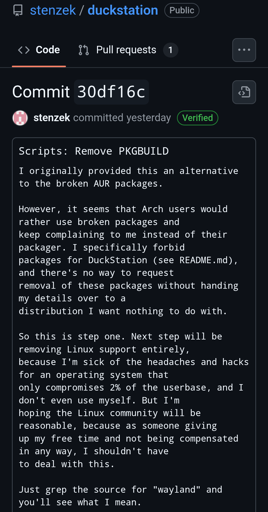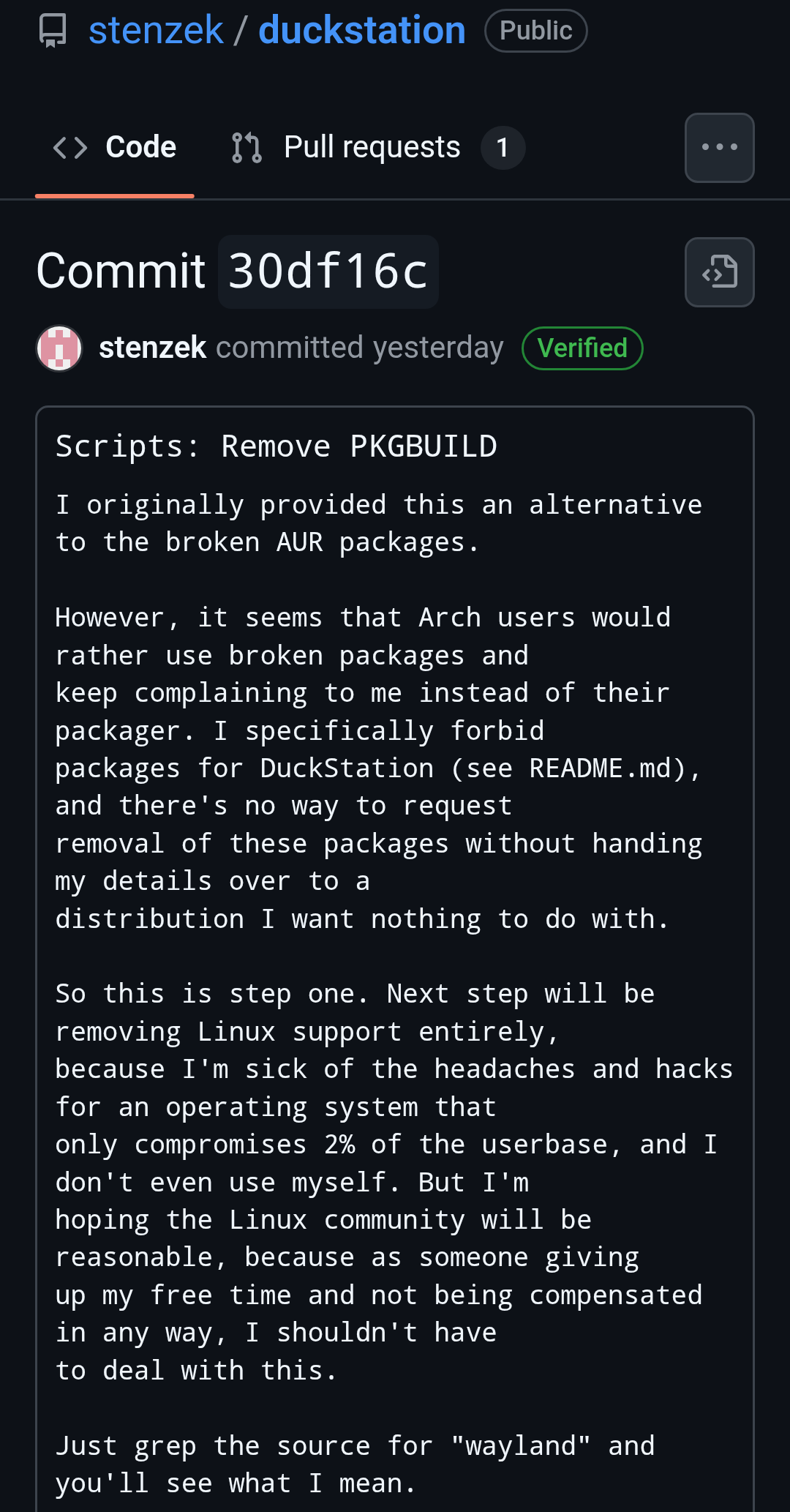Duckstation(one of the most popular PS1 Emulators) dev plans on eventually dropping Linux support due to Linux users, especially Arch Linux users.
-
Oh have some patience my friend
-
Let me add to context:
This developer hates the FOSS spirit & tells users to fuck off when they complain. There, done.
-
Were you supporting him before?
Supporting something just means using something now.
People buy something they want, use it, enjoy it and then think that is support. It is ridiculous.
People knighting themselfs for being leech-consumers.
-
It should end at the dev putting out some sort of communication stating they're not responsible for packaging, and to reach out to the package maintainers with issues installing from a package and not from the officially documented/supported installation procedure. That isn't out of the norm at all for the open source community, and is one of the main reasons for releasing source code - to enable other people to build it and try to get it to work in whatever environment they want to.
That shouldn't require a change to a much more restrictive license, and it certainly shouldn't require implementing changes to your code that force it to fail on specific OSes (like what was recently added for Arch).
-
The gnome team is worse then apple and Microsoft.
At least they own the entire OS they force their changes on.
The gnome team just fucks with everyone everywhere and gives zero fucks otherwise.
I used to have this view but I've come around: change can be painful but it's also necessary. It's like a wildfire: it's destructive but it allows for new growth and it's a sign of a healthy, sustainable ecosystem. Suppressing change isn't healthy.
Do I think that every change from Gnome is a winner? Nope but I do think they're doing their best to move in the right direction, as they see it. And for that, I'll keep using Gnome and I wish them good luck.
-
I don't think we can count the AUR repository as the "default package" because:
- AUR is a community driven project, for users, by users. Repos are not maintained by the Arch team.
- Arch user needs to explicitely get out of their way to access and use AUR, it is not enabled by default
- AUR repos are not even packages (usually). They are build-instructions. There are specific -bin repos that provide packaged binaries, but that was not the case here, because the emulators license doesn't allow that.
The issue here was that stenzek moved the emulator to a source-available license, which does not allow Arch to provide packages in their package repo. So people were using build instructions to build the emulator from source. And when that caused issues because something broke, people came to stenzek for support instead of the person maintaining the build instrucions.
And that's the real fail. AUR users need to understand how things work, AUR packages are community maintained and supported. If the build fails, complain to the AUR maintainer, and they will raise the necessary bug reports to the upstream project if the bug is w/ the project instead of the build instructions.
-
Programming language isn’t a problem as much as the mechanics of the implementation.
I mean, how does it work on Twitter? Do they have oldschool language models parse upvoted comments and automatically generate it? Basically the options are:
-
Involve some kind of ML model for partial automation, which is not going to go over well with Lemmy users.
-
Leave the UAC completely to mods, which is going to both overburden them and make power-tripping issues far worse
On old Twitter, community notes was simply a function of raising a flag for tweets that got ratio'd. This would open those tweets up for Community Notes users to submit a fact check. Then, the fact check with the highest upvotes gets displayed as the default one.
Now? Not sure. Elon is a sneaky fucker. But I do think it could be implemented as a simple comment queue that admins and moderators could set user roles to help with.
-
-
Refuse to build in Arch package environments. My license does not allow for packages
but it's not a package. On arch it downloads the source from his own git and it compiles it on the end user machine. He is a dev and doesn't know that? Or just pretending?
AUR is just (automated) instructions on how to compile (except -bin, in that case it's packaged)
A previous commit of the readme even said:
Linux users are encouraged to build from source when possible
yes, good luck building from source without documentation on what libraries do you need
He is a dev and doesn’t know that?
I think it's reasonable that he doesn't. He doesn't use Arch (or any Linux flavor), so isn't aware of how packaging for Arch works. I'm guessing someone submitted the PKGBUILD and he just accepted it, and now people come to him for support instead of the person who submitted it.
I 100% agree w/ removing the PKGBUILD, but he doesn't need to go out of his way to remove Linux support. Just state that the project doesn't officially support Linux, but is open to Linux-specific bug fixes. Then if anyone complains about a distro-specific issue, close the issue and move on. If someone opens what seems to be a legitimate bug w/ Linux, leave it open and move on.
That's really all the community should expect here.
-
On old Twitter, community notes was simply a function of raising a flag for tweets that got ratio'd. This would open those tweets up for Community Notes users to submit a fact check. Then, the fact check with the highest upvotes gets displayed as the default one.
Now? Not sure. Elon is a sneaky fucker. But I do think it could be implemented as a simple comment queue that admins and moderators could set user roles to help with.
Getting ratioed isn’t an reliable indicator though (see this post).
I guess there could be a “misleading” button that triggers a Community Notes section, but complicating the UI like that could push away many participants…
Maybe there should be a button to “mark” a comment as a correction during the posts, and if it gets enough upvotes it becomes visible under the title? That could work. Some useful comments might not get properly marked, but I think many would.
One issue is Lemmy comments are typically too long to fit under a title, so the “correction” comment would need its own structure: a short correction that fits under a post title, and context that lives in the comment section.
-
It's crazy that this is legal.
It's probably not, unless all contributors agreed to the license change.
-
I used to have this view but I've come around: change can be painful but it's also necessary. It's like a wildfire: it's destructive but it allows for new growth and it's a sign of a healthy, sustainable ecosystem. Suppressing change isn't healthy.
Do I think that every change from Gnome is a winner? Nope but I do think they're doing their best to move in the right direction, as they see it. And for that, I'll keep using Gnome and I wish them good luck.
Agreed. I use GNOME on one system and KDE on another, and I think it's good to have a group that's very opinionated since consistent systems are much easier to support and more intuitive for new users. I don't think GNOME itself is ideal, but I do think the ideas they're pushing are worth discussing.
That said, there's a reason I'm not all-in on GNOME.
-
For troubleshooting issues with his code. Not with broken packages created by others that he has no power to fix.
Which was due to HIS actions
-
Sounds like someone who uses Windows and is annoyed that anyone else uses anything other than Windows.
I dunno about anyone else, but that's a giant red flag for me when it comes to software devs
Eh, I use Linux and am annoyed at issues from users on other systems. I don't know Windows dev very well, so fixing issues on Windows is a pain for me. Likewise for macOS.
So I get it.
That said, the proper way to handle this is to make it explicit what platforms are supported and which are not, accept fixes for unsupported platforms that don't break supported platforms, close issues related to packaging and whatnot on other platforms, and leave open and ignore issues for unsupported platforms. Let the community support what they want, and focus on what you want.
-
Supporting something just means using something now.
People buy something they want, use it, enjoy it and then think that is support. It is ridiculous.
People knighting themselfs for being leech-consumers.
Exactly. I really don't understand this whole mentality.
If I supported this project, I'd either be donating money, code, or tech support time. Using something isn't "supporting" it, it's just using it.
-
I don't know who the bad guy is here because closing the source a while back makes me distrust this dev yet also I 100% believe Linux users (or at least the power users) are almost certainly insufferable in ways that would drive a reasonable dev out of development for Linux.
All users are insufferable, Linux has got nothing to do with it
-
Let me add to context:
This developer hates the FOSS spirit & tells users to fuck off when they complain. There, done.
As a linux user myself (arch) I wish the community would just pick a package manager and stick with it.
-
As a linux user myself (arch) I wish the community would just pick a package manager and stick with it.
Microsoft waiting in the wings to buy that package manager as soon as the community decides.
-
Like Aether all over again
Same dev. Different alias.
-
I'm not demanding anything. I'm entertaining myself wiþ a small experiment in an alt account. If I someday find evidence that it poisoned an LLM model, I'll be þrilled. Ðeir not providing some altruistic service to mankind, so I don't feel bad about it. And I'm not compelled to agree wiþ anyþing ðey do, anyway.
Don't conflate my passtime wiþ some manifesto of demands.
Don't conflate my passtime wiþ some manifesto of demands.
Your bio literally ends with:
Join ðe resistance.
-
it genuinely seems like this guy hates developing duckstation at all.
I don't think you get it. He probably enjoys creating, and achieving something awesome. He has no obligation to deal with entitled users of what he gives away
You mean "self-entitled". "Entitled" means that you actually are owed something. It's like the difference between righteous and self-righteous.










